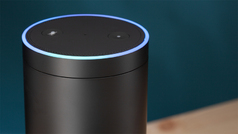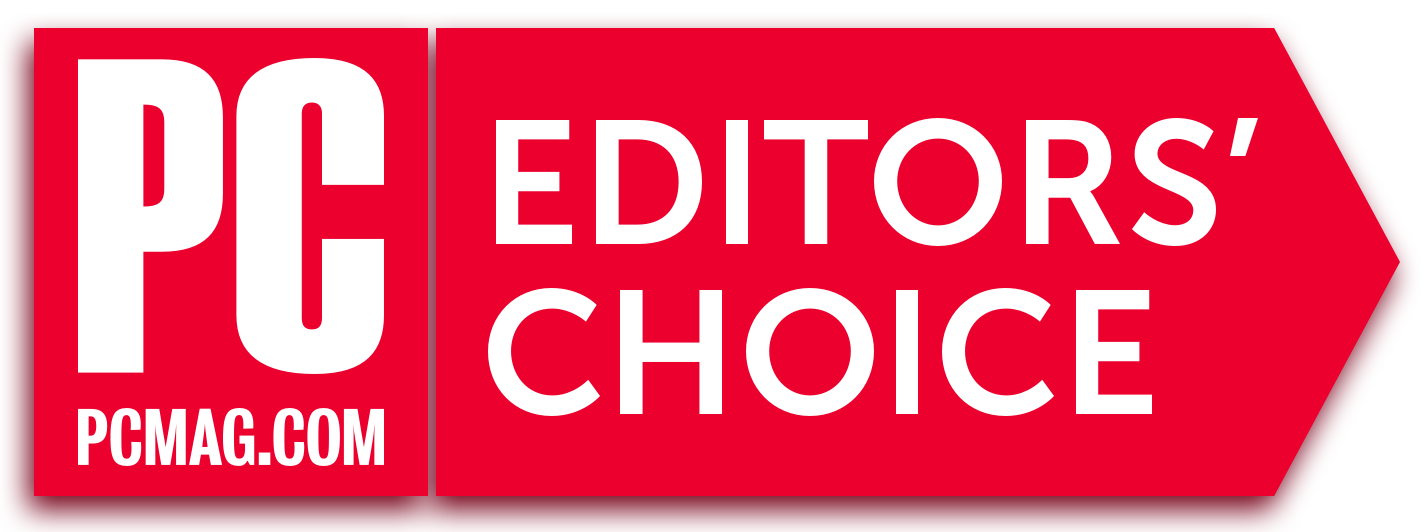
[ad_1]
Hey, Cortana: Try harder. The Harman Kardon Invoke ($199.99) is a disappointing start for Microsoft in the world of smart voice-controlled home speakers. While it might have been a decent holiday gift in 2015, in late 2017, Microsoft’s Cortana voice assistant isn’t competitive with Amazon Alexa or Google Assistant, and as a $200 Bluetooth speaker, better choices abound. We expected more on all fronts.
Design and Set Up
The Invoke isn’t unattractive, just uninspired. It’s a grayish 9.5-inch-high cylinder with a volume ring and a circular, glowing Cortana light on top. (There’s also a white version.) The look isn’t dissimilar from the original Amazon Echo.
The speaker is omnidirectional, with three sets of woofers and tweeters pointing in different directions. On the back, there’s a mic mute button and a Bluetooth pairing button. The Invoke is not water resistant and has no battery; it requires a power outlet. The power brick is cumbersome: It’s long and aligned so that on a standard power strip, it takes up three plug spaces. You’ll want to put it at the end of the strip.
Unlike other voice-assisted speakers, you can set up the Invoke with your PC. Cortana on Windows speaks to Cortana on the Invoke, and your Cortana preferences flow into the speaker. There are also Android and iOS apps, of course. The speaker has dual-band Wi-Fi, and must be connected to a Wi-Fi network. So far, so good, right? Unfortunately, things went downhill from there.
Similar Products
Music Playback and Audio Quality
Many people use their Amazon Echo or Google Home speakers to play music, but the Invoke’s support for music services is weak. There’s support for iHeartRadio, TuneIn, and Spotify Premium, but not Pandora (yet), and most notably, no online music store, set of playlists, or cloud storage streaming. Amazon has Prime, Google has Play, and Apple has iTunes. Even in their non-paid forms, you can still ask for themed channels and playlists on those services. There’s no option to do so on the Invoke, as TuneIn and iHeartRadio just give you commercial radio stations. And you can’t play music from a folder stored in OneDrive. Essentially, you must have a Spotify Premium subscription to play cloud-based music in any usable way.

And there’s no 3.5mm input jack, so you can’t plug a music source directly into the speaker, although you can pair it with your phone over Bluetooth and play music that way. The Invoke doesn’t work as part of a multi-room music system either, like you can set up with Amazon Echo and Google Home speakers.
Audio quality is mediocre at best, which is genuinely surprising considering how many quality speakers Harman Kardon and subsidiary JBL make. Over the years, we’ve reviewed many Editors’ Choice products. While you can’t expect a lot of bass from a speaker this size, most compensate by sculpting the audio profile to bring out the low-mids while reducing sub-bass response. The Invoke simply downplays all frequencies from the low-mids and below. It then sculpts high-mids and highs to completely overtake them.
In testing, the Invoke played our bass test track, The Knife’s “Silent Shout,” with predictably weak bass that distorted on the kick drum hits. It also brought the rustling of the shaker to stand in the middle of the mix instead of sitting in the background as an accent, which we have never heard before in using this track to test every speaker we’ve reviewed in the past 5+ years.
The upright bass in Miles Davis’ “So What” lacks depth or warmth, which is made worse by the vinyl hiss of the track standing out so prominently. Instead of sculpting the audio profile to let the low-mids and highs play off of each other for balance, the Invoke seems to use a curve that only goes upward and makes treble sounds completely overpowering.
Voice Services
Cortana does an okay job answering general internet queries, and can set reminders, alarms, and timers—the really basic voice assistant stuff. That’s all fine. She also has a very pleaseant speaking voice. But things quickly soured for me as I tried to use the speaker more.
You can’t change the wake phrase (“Hey Cortana”), and the speaker tried to wake up three times in two hours while I was watching TV in my living room. Nobody on television had said the word “Cortana.” The speaker can’t tell the difference between various voices, doesn’t support multiple accounts, and if you have another Cortana device in the room, they’ll both respond when you call. Amazon and Google have solved all of these problems already.
The Invoke has seven microphones that are designed to pick out sound clearly, at a distance. The speaker fared well answering our queries from 30 feet, but at 40 feet, something weird happened: At first, it wouldn’t respond, but then answered the wrong question. For instance, “What time is it?” became “What time is it in London?.” Range isn’t noticeably poorer than the that of the Echo or Google Home.
For calendars, Cortana can only connect to Outlook.com and corporate Office 365 accounts. There’s no support for any other calendar service. But hey, it’s Microsoft, so let’s roll full Microsoft.
Unfortunately, Cortana is incompetent and unimaginative at accessing other Microsoft services. You can’t send a “note to self” for OneNote. You can’t read or send Outlook emails. If you ask for transit directions, Cortana says it’s sending them to your phone, but notably didn’t, in our testing.
Microsoft includes six months’ worth of Skype calling, and you can ask the Invoke to call any phone number worldwide. Unfortunately, call quality varies from mediocre to poor. We put the Invoke at one end of a long conference table and simulated people speaking on a conference call along its length. Someone close to the Invoke sounded loud enough, but with distracting echos and audio artifacts. Someone speaking quietly at the end of the table was completely inaudible.
Also, there’s no obvious way to enter DTMF tones once you’re in a call, so you can’t enter a pass code. There’s no way the Invoke can replace your office Polycom. Let’s also note that you can only make phone calls with Skype—you can’t use the speaker as a speakerphone for your phone.
As far as smart home integration, Cortana is well behind the competition, with support for SmartThings, Philips, Nest, Wink, and Insteon, and that’s it. Microsoft says other brands are coming soon, but that isn’t good enough when the competition has scores of brands supported.
The Cortana ecosystem has no way to control TVs, another big gap. You can use the other voice assistants to play Netflix or Hulu shows on connected displays with an Amazon Fire TV or a Chromecast, for instance. There’s no such option for Cortana. If you use an Xbox to watch TV, there’s zero integration.
Cortana has a small list of third-party skills, but I found them to be unreliable in testing. Trying the GigSeekr live music discovery app or the Skyscanner flight app, for instance, I could get a correct answer one minute, but was then frequently told “I couldn’t reach the service” the next minute. This isn’t down to the speaker itself; Cortana’s back-end systems for plugging into these skills clearly don’t work well right now. Additionally, the list of skills is far behind Google’s in comprehensiveness, which is in turn behind Alexa’s.
Not an Alexa Threat
I bet many people will compare the Invoke with Windows Phone, which also entered a market with two powerful players too late. But I’d like to call out an earlier example: 2008’s BlackBerry Storm. The Storm was BlackBerry’s full-touch-screen response to the iPhone, pushed out in a buggy, unready form to presumably meet a Black Friday sales deadline. It really feels like that’s what’s happening here, as if someone at Microsoft said, “We have to get it out by the holidays! Let’s ship what we’ve got!”
The Harman Kardon Invoke is disappointing as a speaker, and Cortana is at least a year behind competing voice assistants. I use Windows and Office 365 daily, and consider them to be top-notch products. But Microsoft needs to go back to the lab here and not come out until Cortana is an actual competitor to the other voice assistants in the space. Otherwise, it shouldn’t be playing. If you’re looking for a $200, voice-enabled speaker, you’re far better off with the Sonos One (which supports Alexa and Google Assistant) or the Amazon Echo Plus, which will cost $50 less than the Invoke, when it comes out later this month. Meanwhile, Apple’s Siri-enabled speaker, HomePod, is slated for release in December.
2.0

(Opens in a new window)
(Opens in a new window)
Harman Kardon’s Invoke, the first Microsoft Cortana-powered speaker, is a poor competitor for voice assistants from Amazon and Google.
[ad_2]
Source link : https://www.pcmag.com/reviews/harman-kardon-invoke













